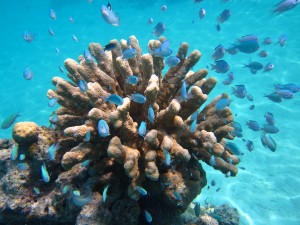U.S. seeks to protect 66 coral species under Endangered Species Act

The health and existence of coral reefs worldwide are in danger and recently NOAA has recognized the urgency by proposing that 66 species of coral be added to the list to be protected under the Endangered Species Act. At present the law only protects two species of coral in the Caribbean. This is a small step forward for the protection of coral reefs within U. S. territory waters which is positive. However, much more needs to be done soon to ensure the preservation of these reefs.
Coral reefs, also known as the “rainforests of the sea,” are home to a quarter of the biodiversity in our oceans. They are not only stunning in their appearance, they are critical to the health of the oceans. And due to many different stressors induced by humans, they are in decline and could collapse within this century if extreme action is not taken to reverse the damage.
I have seen the damage firsthand. The reefs I surveyed in the Seychelles had experienced over 80 percent bleaching during the increased water temperatures as a result of the El Nino event in 1998. They have recovered somewhat but many new coral recruits are growing on dead coral from this event. What used to be pristine vibrant reefs are now mostly rubble in some areas.
These incredible ecosystems are resilient however they are also fragile. The extreme increase in carbon dioxide emissions as a result of human industrial activities have caused the oceans to become acidic and a rise in water temperatures. Ocean acidification makes it harder for coral to grow as it reduces the ability for corals to form their calcified skeleton structures. Increased sea surface temperatures are causing corals to expel the algae that they depend upon for nutrients and survival. Overfishing is causing the overgrowth of harmful algae on coral reefs which can kill an entire reef once the tipping point has been crossed. Point based pollution and nutrient runoff from agriculture cause toxic bacteria and viruses to grow rampantly and kill the corals. And direct human damage from boat anchors and irresponsible tourism can destroy structures of corals that are hundreds of years old in one fell swoop.
I can’t think of a more tragic fate facing us as humans. To live in a world where our children may never know the sheer beauty of a coral reef and the life that it provides. These highly productive underwater ecosystems give us fish for food, pharmaceuticals for our health, protection for our shores and money from tourism just to name a few very important practical resources.
But more than that, the experience of diving down into the heart of a healthy coral reef is like entering the most beautiful painting I could ever imagine except it is even better because it is alive. As you freefall down through the warm turquoise waters, a whole new world is unveiled. One that is teeming with life, vibrant with color and sculpted by tiny animals that create some of the world’s biggest structures that can be seen all the way from space.
There are ways you can help reduce your risk to the existence of these incredible tiny animals. Visit the Coral Reef Alliance to learn how small actions you can take can make a difference even if you do not live by an ocean or have ever seen a coral reef. Your reward will be that someday hopefully you and your children will have the honor of glimpsing into the fascinating world of coral.
Watch this wonderful video with Celine Cousteau to learn more about why coral counts!






Very nice post. I just stumbled upon your weblog and wanted to say that I’ve really enjoyed browsing your blog posts. In any case I will be subscribing to your feed and I hope you write again soon!|
Happy to hear you are subscribing to our feed and thank you for your wonderful feedback!
Thanks for sharing your thoughts. I really appreciate your efforts and I will be waiting for your further write ups thank you once again.|
Great to hear you like our posts! Thank you for your comment!
i was exactly talking about this with a friend yesterday, and now i found about it in your blog. this is awesome. lista de emails lista de emails lista de emails lista de emails lista de emails